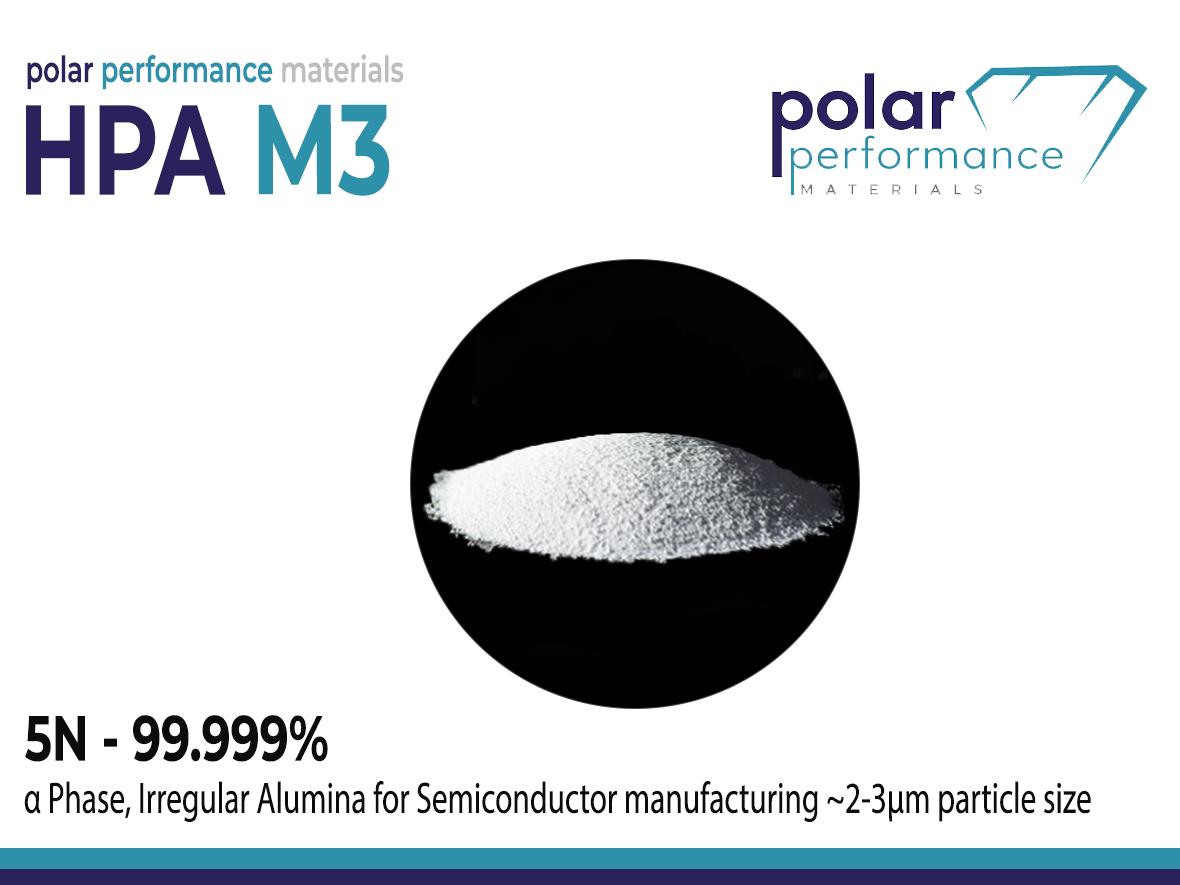HPA-M3 | 5N Purity Alumina
- 5N purity (99.999%)
- 2- 3um particle size
- Ideal for Semiconductor manufacturing
Product Description
HPA-M3 is an alumina powder of the highest purity of 5N grade (99.999%) purity level. It has an irregular morphology and a surface area of 8-15 m²/g. This alumina material is customized to satisfy the rigorous requirements of semiconductor manufacturing, with unmatched performance in applications that demand high temperature and high purity. The D50 particle size is in the range of 2-3 µm, ensuring consistent performance across various processes.
Technical Specifications
| General Properties | |||||||||||
| Morphology | Irregular | ||||||||||
| Particle size (D50) | 2 - 3 um | ||||||||||
| Purity | 99.9999 % | ||||||||||
| Chemical Properties | |||||||||||
| Phase | α | ||||||||||
| Other Properties | |||||||||||
| |||||||||||
Additional Information
| Purity | Key Element concentration (ppmw) | ||||
| Na | Si | Ca | Fe | Others | |
| 5N | <10 | <4 | <3 | <3 | <1 |
High Purity Alumina (HPA) in the Semiconductor Industry
The semiconductor industry demands materials of the highest quality and consistency, and High Purity Alumina (HPA) plays a critical role in ensuring the reliability and performance of cutting-edge technologies. With purity levels ranging from 4N (99.99%) to 5N (99.999%), HPA provides unparalleled advantages for semiconductor manufacturing processes and components.
Applications in the Semiconductor Industry
HPA can be used for a wide variety of applications, providing exceptional benefits. In the following table we tried to outline the applications the impact that HPA can have for Semiconductor related applications.
- Etching Components and Process Equipment
HPA is essential in the production of etch tool components used in advanced semiconductor manufacturing. Its high purity minimizes trace metal contamination, reducing defect rates in intricate devices such as integrated circuits (ICs) and microprocessors. - Ceramic Substrates and Wafer Handling
HPA is a key material for ceramic components like electrostatic chucks and insulating layers used in wafer handling. Its excellent dielectric properties and thermal stability ensure superior performance in high-temperature and high-frequency environments. - Protective Coatings for Semiconductor Tools
Alumina coatings derived from HPA improve the wear resistance and longevity of critical tools and components in semiconductor fabrication. The high hardness and corrosion resistance of HPA-based ceramics protect against chemical and mechanical degradation. - CMP Slurries for Polishing
Chemical Mechanical Planarization (CMP), a crucial process in semiconductor wafer fabrication, uses HPA as a base material for slurries. Its uniform particle size and exceptional purity ensure smooth, defect-free polishing, which is critical for creating high-performance devices. - Sapphire Substrates for LEDs and Optoelectronics
HPA is used to grow sapphire crystals for substrates in light-emitting diodes (LEDs) and optoelectronic components, which are integral to modern semiconductor applications. Sapphire's superior optical clarity and thermal conductivity are made possible by ultra-high purity HPA.
Application | Description | Impact on the Semiconductor Industry |
Etching Components | Used in etching tool parts | Minimizes defect rates due to high purity, crucial for ICs and microprocessors. |
Ceramic Substrates | Electrostatic chucks, insulators | Offers thermal stability and dielectric strength for high-temperature environments. |
Protective Coatings | Enhances tool longevity | Improves resistance to wear and corrosion, extending equipment life. |
CMP Slurries | Base material for polishing | Provides smooth, defect-free wafer surfaces essential for high-performance chips. |
Sapphire Substrates | For LEDs and optoelectronics | Ensures optical clarity and thermal conductivity for efficient LED production. |
Benefits of HPA in Semiconductor Manufacturing
- Reduced Contamination Risks
- Improved Dielectric Performance
- Thermal and Mechanical Stability
- Eco-Friendly Production
Property | Benefit | Description |
Purity Level | 4N (99.99%) to 5N (99.999%) | Reduces contamination, increases yield, and ensures device reliability. |
Dielectric Performance | Excellent insulation properties | Allows for better performance in high-frequency applications. |
Thermal Stability | Maintains integrity under heat stress | Critical for maintaining operational consistency in semiconductor processes. |
Environmental Impact | More sustainable production | Aligns with industry trends towards eco-friendly manufacturing processes. |




